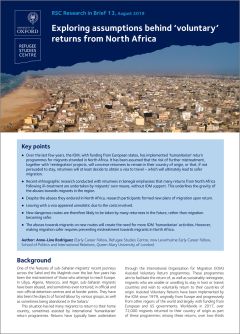Research in Brief: Exploring assumptions behind ‘voluntary’ returns from North Africa
Anne-Line Rodriguez

In recent years, the International Organization for Migration (IOM), with funding from European states, has implemented ‘humanitarian’ return programmes for migrants stranded in North Africa – termed Assisted Voluntary Return programmes. It has been assumed that the risk of further mistreatment, together with ‘reintegration’ projects, will convince returnees to remain in their country of origin, or that, if not persuaded to stay, returnees will at least decide to obtain a visa to travel – which will ultimately lead to safer migration. In the latest RSC Research in Brief, Dr Anne-Line Rodriguez (RSC Early Career Fellow, now Leverhulme Early Career Fellow, School of Politics and International Relations, Queen Mary University of London) presents ethnographic research conducted with returnees in Senegal that challenges these assumptions about ‘voluntary’ returns. It found that many returns from North Africa following ill-treatment are undertaken by migrants’ own means, without IOM support, and that despite the abuses they endured in North Africa, many returnees formed new plans of migration upon return. Further, leaving with a visa appeared unrealistic due to the costs involved. New dangerous routes are therefore likely to be taken by many returnees in the future, rather than migration becoming safer.
